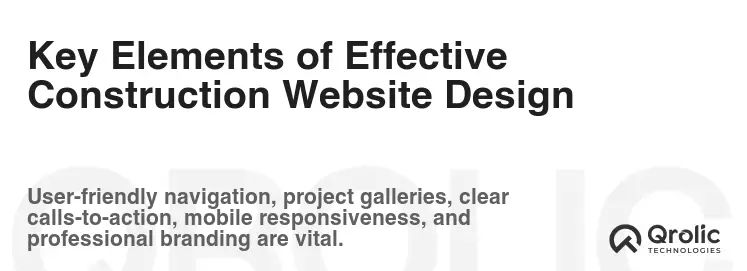Quick Summary:
- Your website is your essential 24/7 digital storefront.
- Prioritize stunning design, easy navigation, and compelling content.
- Showcase projects, optimize for SEO, and blog to get leads.
Table of Contents
- Why Your Construction Firm Needs a Powerful Website
- The Power of First Impressions: Why Website Design Matters
- Beyond the Brochure: What a Website Can Do for Your Construction Firm
- Key Elements of Effective Construction Website Design
- 1. Visually Stunning Design
- 2. User-Friendly Navigation
- 3. Compelling Content
- 4. Strong Calls to Action
- 5. SEO Optimization: Getting Found Online
- The Importance of a Strong Portfolio in Construction Website Design
- What to Include in Your Construction Portfolio
- Tips for Creating a Compelling Construction Portfolio
- Keyword Research: The Foundation of SEO for Construction Websites
- How to Conduct Keyword Research for Construction Firms
- Examples of Keywords for Construction Websites
- Integrating Keywords into Your Website Content
- Blogging for Construction Firms: Building Authority and Driving Traffic
- Benefits of Blogging for Construction Companies
- Blog Post Ideas for Construction Firms
- Tips for Creating a Successful Construction Blog
- Measuring Website Success: Analytics and Reporting for Construction Websites
- Key Metrics to Track for Construction Websites
- Analytics Tools for Construction Websites
- Generating Reports and Making Adjustments
- Qrolic Technologies: Your Partner in Building Exceptional Construction Websites
- How Qrolic Technologies Can Help Your Construction Firm
- Why Choose Qrolic Technologies?
Why Your Construction Firm Needs a Powerful Website

In today’s digital landscape, a robust online presence is no longer optional for construction firms; it’s a necessity. Potential clients, partners, and even employees are increasingly turning to the internet to research companies before making any decisions. Your website serves as your digital storefront, a 24/7 representation of your brand, expertise, and capabilities. Without a compelling and effective website, you’re essentially invisible to a significant portion of your target audience, missing out on valuable opportunities for growth and expansion.
The Power of First Impressions: Why Website Design Matters
Think of your website as the first handshake with a prospective client. A poorly designed or outdated website can immediately create a negative impression, suggesting that your company is behind the times, lacks attention to detail, or isn’t serious about its business. Conversely, a well-designed website conveys professionalism, trustworthiness, and competence, instantly establishing credibility and setting you apart from the competition.
Beyond the Brochure: What a Website Can Do for Your Construction Firm
A website is much more than just a digital brochure. It’s a dynamic tool that can:
- Generate Leads: Capture contact information from potential clients through strategically placed forms and calls to action.
- Showcase Your Portfolio: Display your past projects with stunning visuals and detailed descriptions, demonstrating your expertise and experience.
- Build Trust and Credibility: Share testimonials from satisfied clients and highlight your certifications, awards, and industry affiliations.
- Improve Communication: Provide clear and concise information about your services, processes, and contact details, reducing the need for repetitive inquiries.
- Enhance Brand Awareness: Reinforce your brand identity through consistent messaging, visuals, and design elements.
- Attract Talent: Showcase your company culture and values to attract qualified candidates.
- Streamline Operations: Integrate project management tools and client portals to improve efficiency and communication.
- Gain a Competitive Edge: Stand out from the competition by offering a superior online experience.
- Increase ROI: Convert website visitors into paying clients, driving revenue and growth.
Key Elements of Effective Construction Website Design

Creating a successful website for your construction firm requires a strategic approach that considers both aesthetics and functionality. Here are the key elements to focus on:
1. Visually Stunning Design
- High-Quality Photography & Videography: Showcase your completed projects with professional-grade images and videos that highlight the quality of your workmanship.
- Clean and Modern Layout: Opt for a clean, uncluttered design that is easy to navigate and visually appealing.
- Consistent Branding: Use your brand colors, logo, and fonts consistently throughout the website to reinforce your brand identity.
- Mobile-Responsive Design: Ensure that your website is fully responsive and looks great on all devices, including smartphones and tablets.
2. User-Friendly Navigation
- Clear and Intuitive Menu Structure: Make it easy for visitors to find the information they’re looking for with a clear and logical menu structure.
- Easy-to-Find Contact Information: Prominently display your phone number, email address, and contact form on every page.
- Search Functionality: Implement a search function to allow visitors to quickly find specific information.
- Sitemap: Provide a sitemap to help search engines and users navigate your website.
3. Compelling Content
- Clear and Concise Messaging: Communicate your value proposition in a clear and concise manner, focusing on the benefits you offer to clients.
- Project Portfolio: Showcase your best projects with detailed descriptions, high-quality photos, and client testimonials.
- Services Page: Clearly outline the services you offer, including detailed descriptions and pricing information (if applicable).
- About Us Page: Tell your company’s story, highlight your team’s expertise, and share your core values.
- Blog: Publish valuable content related to the construction industry to attract and engage your target audience (more on this later).
4. Strong Calls to Action
- Strategic Placement: Place calls to action strategically throughout your website, encouraging visitors to take the next step.
- Clear and Concise Language: Use clear and concise language that tells visitors exactly what you want them to do.
- Visually Appealing Design: Make your calls to action visually appealing with contrasting colors and compelling design elements.
- Examples of Effective Calls to Action:
- “Get a Free Estimate”
- “Contact Us Today”
- “View Our Portfolio”
- “Download Our Brochure”
- “Request a Consultation”
5. SEO Optimization: Getting Found Online
- Keyword Research: Identify the keywords that your target audience is using to search for construction services online (see keyword research section below).
- On-Page Optimization: Optimize your website’s content, titles, and meta descriptions with relevant keywords.
- Image Optimization: Optimize your images with descriptive file names and alt tags.
- Mobile-Friendliness: Ensure that your website is mobile-friendly, as Google prioritizes mobile-first indexing.
- Website Speed: Optimize your website’s speed to improve user experience and search engine rankings.
- Link Building: Build high-quality backlinks from reputable websites in your industry.
The Importance of a Strong Portfolio in Construction Website Design

Your portfolio is arguably the most important section of your construction website. It’s where you showcase your past work and demonstrate your capabilities to potential clients. A well-crafted portfolio can be the deciding factor in whether a client chooses to work with you or not.
What to Include in Your Construction Portfolio
- High-Quality Photos and Videos: Use professional-grade images and videos that showcase the quality of your workmanship.
- Detailed Project Descriptions: Provide detailed descriptions of each project, including the scope of work, challenges overcome, and results achieved.
- Client Testimonials: Include testimonials from satisfied clients to build trust and credibility.
- Project Location: Include the location of each project to give potential clients a sense of your service area.
- Project Cost (Optional): You may choose to include the project cost to give potential clients a general idea of your pricing.
- Before and After Photos: If applicable, include before and after photos to showcase the transformation you were able to achieve.
Tips for Creating a Compelling Construction Portfolio
- Showcase a Variety of Projects: Include a variety of projects to demonstrate your expertise in different areas of construction.
- Focus on Your Best Work: Prioritize your best projects and make sure they are prominently displayed.
- Keep It Updated: Regularly update your portfolio with new projects to keep it fresh and relevant.
- Organize by Category: Organize your portfolio by project type (e.g., residential, commercial, renovation) to make it easy for visitors to find what they’re looking for.
- Make It Easy to Navigate: Ensure that your portfolio is easy to navigate and that visitors can easily find the projects they’re interested in.
Keyword Research: The Foundation of SEO for Construction Websites

Keyword research is the process of identifying the terms and phrases that your target audience is using to search for construction services online. This information is crucial for optimizing your website’s content and improving your search engine rankings.
How to Conduct Keyword Research for Construction Firms
- Brainstorming: Start by brainstorming a list of keywords related to your services, target audience, and location. Think about what potential clients would type into Google when searching for a construction company.
- Competitor Analysis: Analyze your competitors’ websites to see what keywords they are targeting.
- Keyword Research Tools: Use keyword research tools like Google Keyword Planner, SEMrush, Ahrefs, and Moz Keyword Explorer to find relevant keywords and analyze their search volume, competition, and cost-per-click (CPC).
- Long-Tail Keywords: Focus on long-tail keywords, which are longer and more specific phrases that have lower search volume but higher conversion rates. For example, instead of targeting the keyword “construction,” target the long-tail keyword “residential construction company in [your city].”
- Location-Based Keywords: Include your city or region in your keywords to target local customers. For example, “construction company in [your city]” or “home builders in [your region].”
Examples of Keywords for Construction Websites
Here are some examples of keywords that construction firms can target:
- General Keywords: construction, construction company, construction services, general contractor, home builder, commercial construction, residential construction, renovation, remodeling
- Service-Specific Keywords: new home construction, kitchen remodeling, bathroom renovation, basement finishing, deck building, roofing, siding, concrete work, excavation, demolition
- Location-Based Keywords: construction company in [your city], home builders in [your region], general contractor near me
- Long-Tail Keywords: affordable home construction in [your city], best kitchen remodeling contractors in [your region], experienced commercial construction company in [your state]
Integrating Keywords into Your Website Content
Once you have identified your target keywords, it’s important to integrate them naturally into your website’s content, including:
- Page Titles: Use relevant keywords in your page titles.
- Meta Descriptions: Write compelling meta descriptions that include your target keywords.
- Headings and Subheadings: Use keywords in your headings and subheadings to break up your content and improve readability.
- Body Text: Incorporate keywords naturally into your body text, but avoid keyword stuffing.
- Image Alt Tags: Use descriptive alt tags for your images that include your target keywords.
- URL Structure: Create SEO-friendly URLs that include your target keywords.
Blogging for Construction Firms: Building Authority and Driving Traffic

A blog is a powerful tool for construction firms to attract new clients, establish themselves as industry experts, and improve their search engine rankings.
Benefits of Blogging for Construction Companies
- Attracts Organic Traffic: Blog posts can rank in search engines for relevant keywords, driving organic traffic to your website.
- Establishes Authority: Publishing valuable content on your blog demonstrates your expertise and establishes you as a thought leader in the construction industry.
- Generates Leads: You can use your blog to generate leads by offering free resources, such as e-books, checklists, and webinars, in exchange for contact information.
- Improves Brand Awareness: Blogging helps to increase brand awareness and build relationships with potential clients.
- Provides Value to Clients: A blog can provide valuable information to clients, helping them to make informed decisions about their construction projects.
Blog Post Ideas for Construction Firms
Here are some blog post ideas for construction firms:
- Tips for Hiring a Contractor: Provide advice on how to find and hire a reputable contractor.
- Common Construction Mistakes to Avoid: Share common mistakes that homeowners and businesses make during construction projects.
- The Latest Trends in Construction: Discuss the latest trends in construction, such as sustainable building practices and smart home technology.
- Project Case Studies: Share detailed case studies of your past projects, highlighting the challenges you overcame and the results you achieved.
- Cost Estimating Guides: Provide guides on how to estimate the cost of different types of construction projects.
- Permitting and Regulations: Explain the permitting and regulations process for construction projects in your area.
- Home Maintenance Tips: Share tips on how to maintain a home and prevent costly repairs.
- Interviews with Industry Experts: Interview other industry experts, such as architects, engineers, and interior designers.
- Behind-the-Scenes Look at Your Company: Give readers a behind-the-scenes look at your company, highlighting your team, culture, and values.
- Answer Common Questions: Answer common questions that clients have about construction projects.
Tips for Creating a Successful Construction Blog
- Write High-Quality Content: Focus on creating high-quality content that is informative, engaging, and well-written.
- Target Your Audience: Write content that is relevant to your target audience.
- Use Keywords: Incorporate relevant keywords into your blog posts to improve your search engine rankings.
- Promote Your Blog: Promote your blog posts on social media and through email marketing.
- Be Consistent: Post regularly to keep your audience engaged and coming back for more.
- Engage with Your Readers: Respond to comments and questions from your readers.
- Use Visuals: Include images and videos in your blog posts to make them more engaging.
Measuring Website Success: Analytics and Reporting for Construction Websites

Once your website is live, it’s important to track its performance and make adjustments as needed. This involves using analytics tools to monitor key metrics and generate reports.
Key Metrics to Track for Construction Websites
- Website Traffic: Track the number of visitors to your website, as well as the sources of your traffic (e.g., organic search, paid advertising, social media).
- Bounce Rate: Monitor the percentage of visitors who leave your website after viewing only one page.
- Time on Page: Track the average amount of time that visitors spend on your website pages.
- Conversion Rate: Measure the percentage of visitors who complete a desired action, such as filling out a contact form or requesting a quote.
- Lead Generation: Track the number of leads generated through your website.
- Cost Per Lead: Calculate the cost per lead to determine the effectiveness of your marketing efforts.
- Return on Investment (ROI): Measure the return on investment for your website and marketing efforts.
Analytics Tools for Construction Websites
- Google Analytics: A free and powerful web analytics tool that provides detailed insights into website traffic, user behavior, and conversion rates.
- Google Search Console: A free tool that helps you monitor your website’s performance in Google search results.
- SEMrush: A comprehensive SEO tool that provides keyword research, competitor analysis, and website audit features.
- Ahrefs: Another popular SEO tool that offers similar features to SEMrush.
- Moz Pro: An SEO tool that provides keyword research, rank tracking, and website audit features.
Generating Reports and Making Adjustments
Regularly generate reports on your website’s performance and use the data to make adjustments to your website’s design, content, and marketing strategies. This will help you to continuously improve your website’s effectiveness and achieve your business goals.
Qrolic Technologies: Your Partner in Building Exceptional Construction Websites

At Qrolic Technologies, we understand the unique challenges and opportunities that construction firms face in the digital world. We are a team of experienced web designers and developers who specialize in creating custom websites that help construction companies attract new clients, showcase their expertise, and grow their businesses.
How Qrolic Technologies Can Help Your Construction Firm
- Custom Website Design: We create custom website designs that reflect your brand identity and meet your specific business needs.
- Mobile-Responsive Design: We ensure that your website is fully responsive and looks great on all devices.
- SEO Optimization: We optimize your website for search engines to help you attract more organic traffic.
- Content Creation: We can help you create compelling content for your website, including blog posts, case studies, and testimonials.
- Website Maintenance and Support: We provide ongoing website maintenance and support to ensure that your website is always up-to-date and running smoothly.
- E-commerce Solutions: We can build e-commerce solutions for construction firms that sell products online.
- Project Management Tools Integration: We can integrate project management tools into your website to streamline your operations and improve communication with clients.
- Client Portal Development: We can develop custom client portals that allow your clients to access project updates, documents, and invoices online.
Why Choose Qrolic Technologies?
- Industry Expertise: We have extensive experience working with construction firms and understand the unique needs of your industry.
- Custom Solutions: We create custom solutions that are tailored to your specific business goals.
- Results-Driven Approach: We are focused on delivering results and helping you achieve your business objectives.
- Excellent Customer Service: We provide excellent customer service and support to ensure that you are completely satisfied with our services.
- Affordable Pricing: We offer competitive pricing to fit your budget.
Contact Qrolic Technologies today at https://qrolic.com/ to learn more about how we can help you build a powerful website that drives results for your construction firm.






